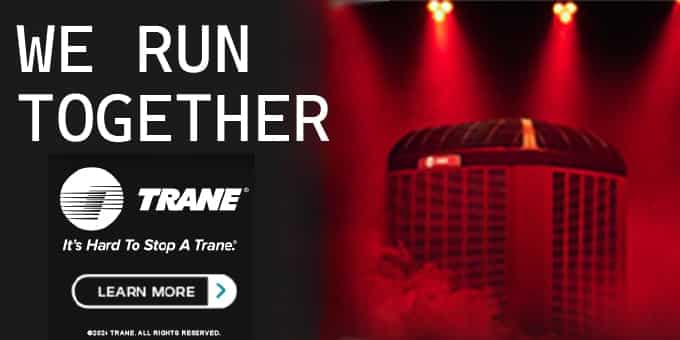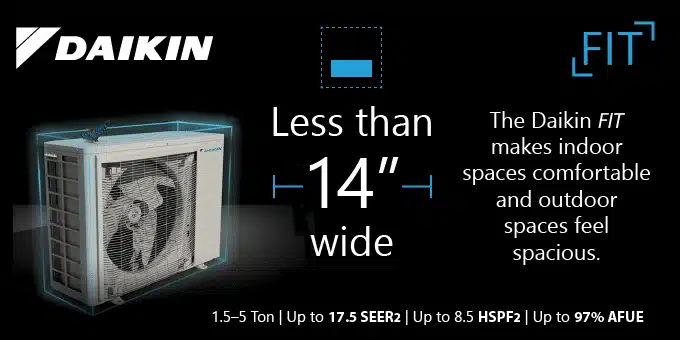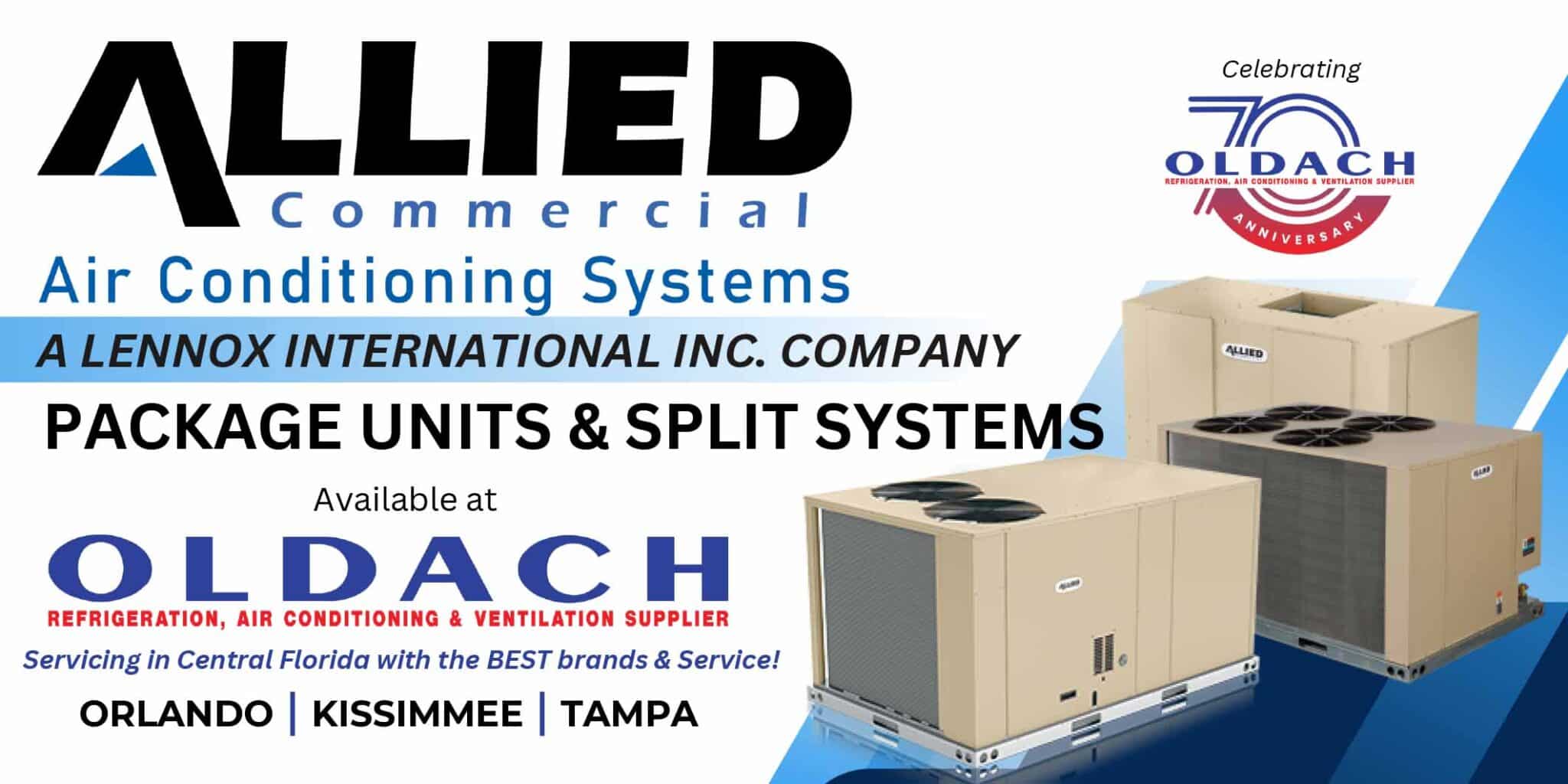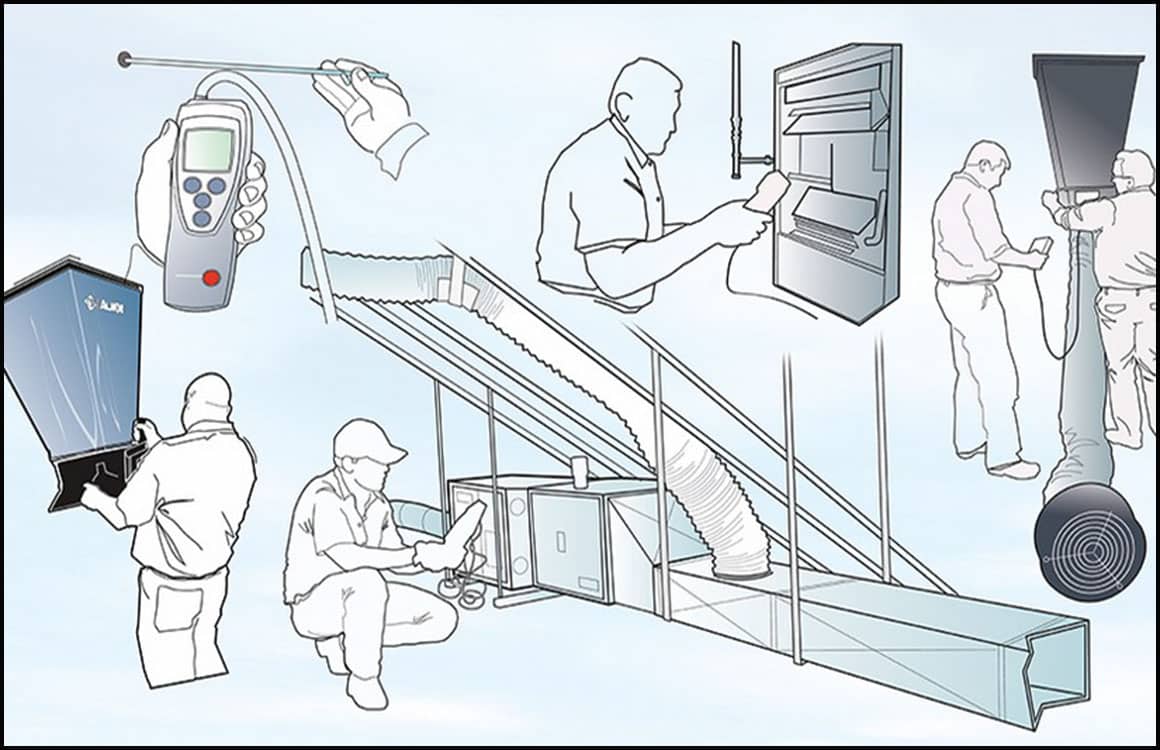
Because the name of the website is HVAC School, I get a lot of people who assume we either:
A) Have a physical location
B) Sell online courses
You are probably aware by now that we do neither of those things. We are a free learning resource for anyone looking to improve their professional skills in HVAC/R, and we are PRIMARILY for techs by techs, as our tagline proclaims.
Many people ask me what school they should attend or what online course they should consider, and many ask, “Is going to trade school even worth it?” I will attempt to answer these questions broadly, but please allow me to share my education experience and philosophy first.
My Background
I was homeschooled K-12, and I graduated high school at 16. Prior to the age of 16, I had already helped my grandpa pull apart aircraft, worked with my friend and his dad pouring concrete and framing houses, and helped my uncle as an electrical apprentice installing lighting in grocery stores.
I went to one year of HVAC/R trade school at 16 and started working in the field at 17. At the time, I really liked my instructor, but he was not very engaged with actively instructing, and I spent most of my time reading and alone in the lab doing who knows what.
While I did want to learn, I didn’t know what the things I was learning meant in real life. Once I got into the field, all of the little fragments of understanding and experience started to come together and make sense to me. In other words, information is meaningless unless it is coupled with application and successful repetition.
My Philosophy
My philosophy on trades education is now formed by my own experience as a student, apprentice, and tech, and then as a corporate trainer, business owner, and content creator. This philosophy continues to change and evolve as I meet new people and gain their perspectives, as you will hear.
Here is the short version of my philosophy:
Trades education should be focused on successful outcomes of proper design, installation, commissioning, repair, maintenance, customer service, and co-worker interaction rather than on ambiguous concepts. This requires interest and focused attention by the student and instruction focused on working through challenges with these students until they achieve outcomes acceptable to industry.
In other words, while I wish students would all fully understand Ohm’s law, that only matters if it helps them do something practical they can be expected to encounter in their jobs. Until a student can start APPLYING the information, it will quickly begin to fade from memory, and some people have a better “fact memorization” memory than others. Most people need REGULAR reiteration and application for facts to stick.
Because of this philosophy, my own experiences with students, and my experiences as a student, I tend to approach traditional trade education with some skepticism—not that there is anything fundamentally broken or that the instructors are to blame, but something has always felt… missing.
I now feel I owe traditional trades education an apology—we will get to that.

My Epiphany
I have the honor of knowing some really generous and distinguished instructors and past instructors, such as Rick Ruscigno with Lincoln Tech, Jason Obrzut and Eugene Silberstein with ESCO, Ty Branaman, and many, many more. These guys play such an important role in the industry, and I confess that I rarely take enough time to thank them for the important work they do.
One past instructor is my friend, Gary Reecher, and Gary is very active in the HVAC School group and many others. He always shares great resources. A while ago, Gary asked if I would be willing to come up to Louisville, KY, and help judge the SkillsUSA nationals HVAC/R competition.
I will be honest; all I could think about was my ABYSMAL performance in a VICA competition (the precursor to SkillsUSA) when I was 16 and how stupid I felt trying to do an electronic leak detection when I had never used an electronic leak detector before.
However…
It was Gary asking, and I was very appreciative to him for all his contributions to the industry, so I said yes.
When I arrived at the Kentucky Expo Center, I realized this event was MUCH bigger than I thought. It completely took over three wings of the convention center with vendor displays and competition areas as far as you could see in all directions. There were people, young and old, rushing all over, and it was clear that this was a serious event with a lot of interest from many different industries.
I found the HVAC/R competition area, and Gary showed me around the various stations by Carrier, Lennox, Harris, Haier, Emerson, Hussman, and RSES. These competitions covered everything from recovery, evacuation, and charging (the area I worked in) to brazing, electrical diagnosis, refrigerant circuit diagnosis, and airflow testing. I was quite impressed by the diversity of topics covered and the quality of the test equipment.
The competitors were all trade school students who had already competed locally and in their states and won or placed high enough to fill in if the winners couldn’t make it. As the competition began, the students began filing into the work areas. They were judged on their aptitude in performing the task, proper safety practices, and their answers to some questions related to the task at hand in a maximum of 45 minutes.

I judged seven competitors personally. The skills ranged from several who performed the tasks smoothly and perfectly with one student who explained everything he did as he worked with great precision to several others who had no idea how to connect the recovery machine.
It took me back to my nervous and horrid performance in the VICA competition when I was in school and forced me to think about what was missing for me in school and how it changed when I went into the field.
All of the students at the competition clearly had an interest in the HVAC/R field, though that level of commitment certainly varies. All of them have active minds, or they wouldn’t have gotten this far. I would be willing to bet one of the primary differences between those who do well and those who don’t come down to:
- Enthusiastic personal instruction
- Focused hands-on repetition
I think the SkillsUSA competition is an excellent way to help focus students on applying the skills of the trade by getting them to perform reps on the skills of the trade rather than memorization of facts.
While the concept of competition may not appeal to all students, the pressure of competition is actually a strong simulation of the pressures of being in the field with the customer watching and the clock running.
Then it struck me…
I’ve been in this trade for 20 years, and this is the first time I’ve ever even CONSIDERED helping at an event like this.
So, I’m ready to recommit myself to helping traditional trades education in my area AND lending a hand to organizations like SkillsUSA that help to instill the hands-on skills needed to succeed in the trade.
I apologize to those instructors who have worked tirelessly and thanklessly educating students without the support of the field they need.
I encourage techs, contractors, reps, wholesalers, manufacturers, and engineering firms to participate in traditional trades education and organizations like SkillsUSA actively.
But HOW?
Well, Gary stepped in again and wrote this incredible “how-to” list on getting involved, and I share it here with his permission:
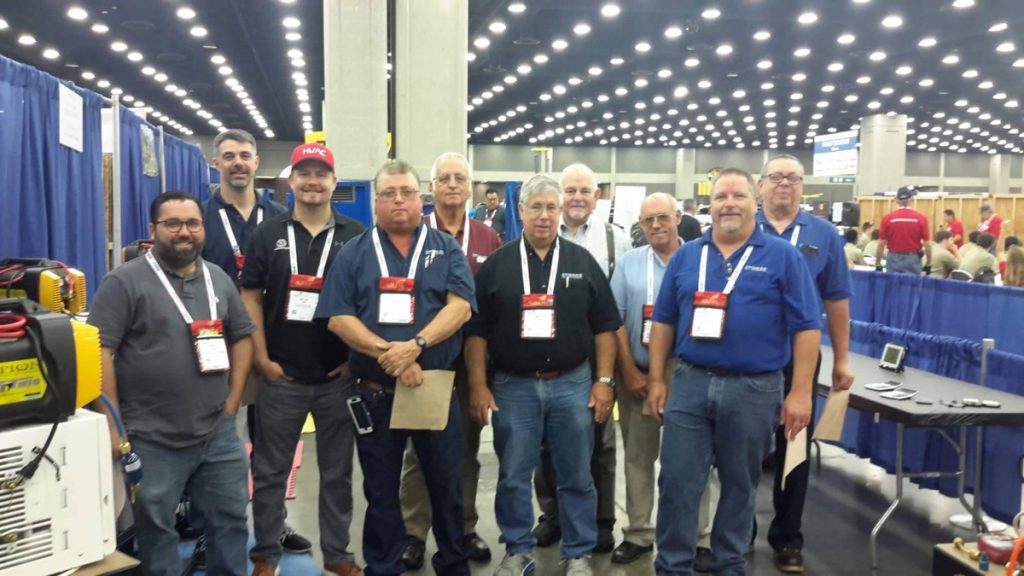
SkillsUSA 2019 RSES judges from left to right: Joseph Kloke, Eric Kaiser, Bryan Orr, Mike Ekstein, Gary Reecher, Mike Ralston, Steve Wright, David Cooley, Rich Hoke, and Desi Rigg.
Things you can do to improve and increase the visibility of the HVAC/R Trade (by Gary Reecher)
1. Become a member of your local school’s technical/advisory board, which seeks input from local HVAC industry contractors and technicians.
2. Evaluate what the local school is teaching. Does it lack training in certain areas? Airflow measuring and troubleshooting? Electrical troubleshooting? Carbon monoxide evaluation? Combustion measurement? Many schools lack ductwork on their equipment to train students on measuring airflow by either static pressure, pitot tube, vane anemometer, or temperature rise methods. Most schools do not have a replica building where blower door testing, back-drafting, carbon monoxide testing, etc.
3. Equipment. If you have equipment that is changed out but is still functional, offer it to your local school.
4. Troubleshooting equipment. Many schools purchase pre-built equipment. You can make your own troubleshooting equipment. Before I retired, I modified air conditioners and gas and electric furnaces where electrical troubles could be inserted, such as defective run capacitors, motors, compressor, heating element, gas valve, thermostats, limits, etc.; you get the idea. For airflow training, one furnace was completely outfitted with supply and return air ductwork. Dampers were placed in the trunk duct to change the airflow and static pressure. Different types of takeoffs were installed to show how a round takeoff reduces airflow versus a tapered duct takeoff—a tee takeoff with 10 feet of round steel duct with a register and boot on one side of the tee. On the other side, the same type of register boot and the register were installed on a stretched length of flexible duct. The duct was supported on 1-1/2-inch-wide straps and hung from a strap with a roller on a cable where the duct could be stretched or collapsed where students could measure airflow from the register with the duct extended or collapsed. This shows the student what happens when the duct is properly stretched or collapsed and commits it to their memory. The evaporator coil was installed above a duct collar above the furnace heat exchanger. The duct collar had an access panel where a piece of felt could be installed on the coil inlet to reduce airflow, or the coil could be raised, and a wood block could be installed to allow airflow to bypass the evaporator coil. The system also had an Arzel zone system installed. Basic electrical boards are great for allowing students to construct basic electrical circuits. But with some imagination and toggle switches, one can turn that basic board into a troubleshooting board.
4a. Just thought of this. Add Zebra Instruments Short Pros in line with transformer 24 vac fuse. It is one of those auto-resetting circuit breakers that a light goes on when there is a short and goes out when the short goes away.
I wanted to create an air conditioning troubleshooter with a refrigeration receiver and some solenoids where the subcooling could be increased or decreased (and where a solenoid could meter refrigerant past the TXV but never got the time to do).
5. Do not count equipment manufacturers out for school donations. Many manufacturers are willing to provide equipment to schools that actively ask for equipment and that they know the school will use. I recall one time when the AHRI Exposition was in McCormick Place in Chicago, and the present class went on a field trip to the exposition. Three or four months later, a truck showed up with six pallet loads of equipment. Unbeknownst to the instructors, a couple of the students talked about our program so much to the VP’s wife that we received loads of donated equipment.
That brings up the next truth:
IF YOU DO NOT ASK, YOU WILL NOT RECEIVE
6. If you can take time to visit vocational and community colleges outside your local area, do so. Different schools have different equipment and different methods of approaching training. It is good to get input from different sources. These inputs can be brought back, discussed, and possibly included in the training program. In other words, don’t live isolated in your own bubble. Break the bubble and learn what other training programs are doing.
7. PHCC RIDE and DECIDE program. They have a ride-along program to acquaint high school juniors and seniors with the HVAC/R industry. They will spend a few days or a week riding with service technicians or installers. Check with your local PHCC about that program.
8. Don’t disregard psychrometrics or enthalpy training. It is useful.
9. If you are not an RSES member, join. It is not just a monthly magazine. They also have webinars typically on the 4th Wednesday of the month on a variety of topics from economizers, mini splits, psychrometrics, enthalpy, demystifying the reversing valve, etc. If you miss a webinar, you can look at it in the archives and show them to students.
I think another interesting idea would be to have qualified technicians go into trade schools once a month for two hours on a staggered schedule and do some hands-on projects with students on the lab equipment or with a still operational changeout unit they bring with them. If a company has five quality techs, that amounts to five hands-on projects a month for a handful of students and would make a huge difference.
The challenge in schools is getting sufficient time with tools in hand doing the tasks of the trade, and closer association with techs and contractors could go far in helping to make that happen.
In conclusion, that “something” that feels missing in schools sometimes is the connection to the people and skills of the field, and the only person to take the blame for that is myself.
So, let’s get involved!
—Bryan
Bryan bio:
Co-Founder and President at Kalos Services, Bryan Orr has been involved in HVAC training for over 13 years. Bryan started HVAC School to be free training HVAC/R across many mediums, For Techs, By Techs.
Contact Bryan by emailing bryan@HVACRSchool.com.
Visit https://hvacrschool.com – The place to learn some things you’ve forgotten along the way as well as remind you of some things you forgot to know in the first place.





